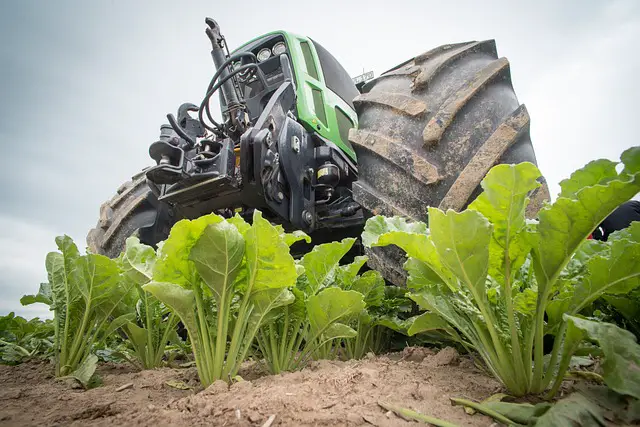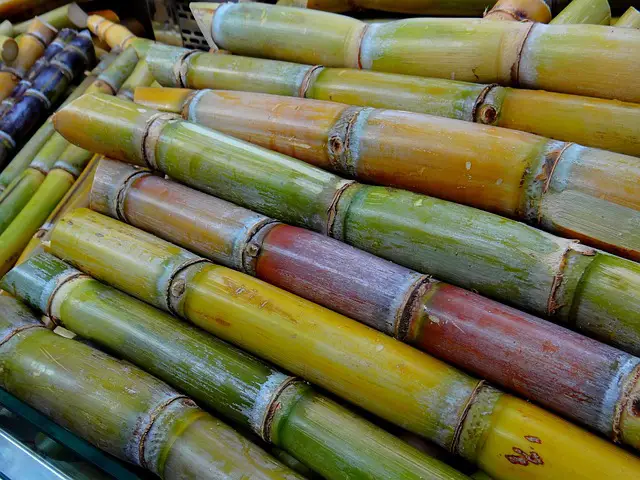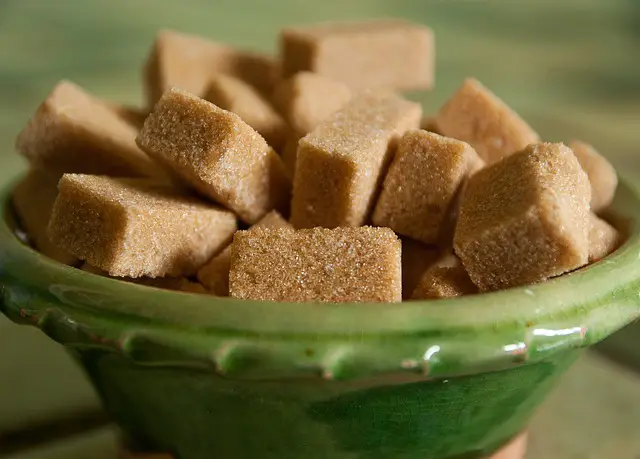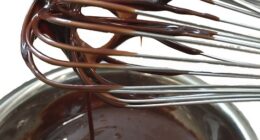Beet sugar and cane sugar are both types of natural sugars. Both have a similar sweetness and texture, but their production processes are different. Cane sugar is typically produced from the plant’s juice, while beet sugar is produced from the root of the plant. Each type has its own unique properties that may make it more suitable for certain applications than the other.
What is beet sugar?
(Image by Wolfgang Ehrecke from Pixabay )

Beet sugar is a type of sugar that is extracted from sugar beets. Sugar beets are a variety of beetroot that are grown specifically for sugar production. The sugar is extracted by slicing the beets into thin strips and then boiling them in water to create a sugary syrup. This syrup is then purified and crystalized to create the final product, which is similar to cane sugar in taste and texture. Beet sugar is commonly used as a sweetener in a variety of food and beverage products.
What is cane sugar?
(Image by Corinna Schenk from Pixabay )

Cane sugar, also known as sucrose, is a type of sugar that is extracted from the sugarcane plant. Sugarcane is a tall, perennial grass that grows in tropical and subtropical regions around the world. To extract the sugar, the sugarcane is harvested and crushed to extract the juice. The juice is then boiled to create a thick syrup, which is treated to remove impurities and crystalized to create the final product, which is light brown in color and has a characteristic sweet taste. Cane sugar is commonly used as a sweetener in a wide range of food and beverage products.
The difference in appearance between beet sugar and cane sugar
Beet sugar and cane sugar can have slightly different appearances, although they are both similar in taste and can be used interchangeably in most recipes.
Beet sugar is typically a fine, white granular sugar, similar in appearance to granulated cane sugar. However, because of the way it is processed, beet sugar may have a slightly different texture and may be slightly stickier than cane sugar.
Cane sugar, on the other hand, can come in a variety of forms and colors, depending on how it is processed. Granulated cane sugar is typically a fine, white sugar, but other varieties, such as demerara sugar, turbinado sugar, and muscovado sugar, have a coarser texture and a darker color. These types of cane sugar are less refined than granulated cane sugar and may contain more molasses, which gives them their distinct color and flavor.
In summary, while both beet sugar and cane sugar are similar in taste and can be used interchangeably in most recipes, they may have slightly different appearances and textures.
Beet sugar Vs. Cane sugar – Key differences
Source: Beet sugar is extracted from sugar beets, which are a type of beetroot, while cane sugar is extracted from sugarcane, which is a type of tall grass.
Processing: Beet sugar and cane sugar are processed differently. Beet sugar is extracted by slicing the beets into thin strips and then boiling them in water to create a sugary syrup, which is then purified and crystalized. Cane sugar, on the other hand, is extracted by crushing the sugarcane to extract the juice, which is then boiled to create a thick syrup that is purified and crystalized.
Color and flavor: Beet sugar and cane sugar can have slightly different colors and flavors. Beet sugar is typically white and has a slightly different texture compared to cane sugar. Cane sugar can come in a variety of colors and flavors, depending on how it is processed. For example, demerara sugar, turbinado sugar, and muscovado sugar are all varieties of cane sugar that have a coarser texture and a darker color, and may have a distinct flavor due to the presence of molasses.
Geographic location: Beet sugar is more commonly produced in Europe, while cane sugar is more commonly produced in tropical regions, such as Brazil and India.
Sustainability: Some people argue that cane sugar is more sustainable than beet sugar, as sugarcane is a perennial crop that can be harvested for several years, while sugar beets are an annual crop that must be replanted each year. Additionally, the production of beet sugar can sometimes involve the use of genetically modified organisms (GMOs), while cane sugar is typically non-GMO.
Both beet sugar and cane sugar are similar in terms of their chemical composition and use as a sweetener, there are some key differences between them in terms of source, processing, color and flavor, geographic location, and sustainability.
The difference in production between beet sugar and cane sugar
The main difference between beet sugar and cane sugar is in their production. Beet sugar is produced from the sugar beet, while cane sugar is produced from the sugarcane plant. Both plants contain high levels of sucrose, but the production process for each type of sugar is different.
Beet sugar production begins with the harvesting of the Sugar Beet. The beets are then washed and sliced thin so that they can be boiled and extracting the sucrose syrup. The syrup is then filtered and purified before being turned into granulated beet sugar.
Cane Sugar production begins with the harvesting of fresh Sugar Cane stalks. The stalks are then crushed to extract the juice which contains high levels of sucrose. The juice is then boiled to evaporate the water, leaving behind a thick syrup rich in sucrose. This syrup is then filtered and purified before being turned into granulated cane sugar.
Which type of sugar is better for you?
Both beet sugar and cane sugar are very similar in terms of their chemical composition and nutritional content. Both types of sugar contain a high amount of calories and provide only empty calories with no essential nutrients. In general, it is recommended to limit the consumption of added sugars in the diet as excessive consumption of added sugars can lead to weight gain, dental problems, and other health issues.
However, some people argue that cane sugar may be a more sustainable choice than beet sugar, as sugarcane is a perennial crop that can be harvested for several years, while sugar beets are an annual crop that must be replanted each year. Additionally, the production of beet sugar can sometimes involve the use of genetically modified organisms (GMOs), while cane sugar is typically non-GMO.
Ultimately, the best approach is to consume added sugars in moderation and to choose a variety of foods that provide essential nutrients, such as fruits, vegetables, whole grains, lean proteins, and healthy fats.
What are the advantages and disadvantages of beet sugar?
Here are some potential advantages and disadvantages of beet sugar:
Advantages:
- Beet sugar is a plant-based sweetener that is vegan-friendly and free from animal products.
- Beet sugar is a good source of energy and can be used to fuel physical activity.
- The production of beet sugar may help support local economies and provide jobs in rural areas.
- Beet sugar has a longer shelf life than some other types of sweeteners and can be stored for long periods without spoiling.
- Beet sugar can be used in a wide variety of applications, including baked goods, beverages, and processed foods.
Disadvantages:
- Beet sugar is a highly refined product that provides empty calories with no essential nutrients.
- The production of beet sugar can be resource-intensive and may contribute to environmental issues, such as soil depletion and water pollution.
- The production of beet sugar may involve the use of genetically modified organisms (GMOs) and synthetic pesticides, which can have negative effects on the environment and human health.
- The consumption of excessive amounts of beet sugar, like other added sugars, can lead to weight gain, dental problems, and other health issues.
- Some people may be allergic or sensitive to beet sugar, which can cause digestive issues or other adverse reactions.
Beet sugar can be a versatile and widely used sweetener, it is important to consume it in moderation and consider its potential impact on the environment and human health.
What are the advantages and disadvantages of cane sugar?
Advantages:
- Cane sugar is a plant-based sweetener that is vegan-friendly and free from animal products.
- Cane sugar has a lower glycemic index compared to beet sugar, meaning it is less likely to cause a rapid spike in blood sugar levels.
- Cane sugar has a natural brown color and a distinct flavor that can enhance the taste of certain foods and beverages.
- Sugarcane is a perennial crop that can be harvested for several years, making it a potentially more sustainable choice compared to sugar beets, which are an annual crop.
- Cane sugar is versatile and can be used in a wide variety of applications, including baking, cooking, and sweetening beverages.
Disadvantages:
- Cane sugar is a highly refined product that provides empty calories with no essential nutrients.
- The production of cane sugar can be resource-intensive and may contribute to environmental issues, such as deforestation, soil depletion, and water pollution.
- The production of cane sugar may involve the use of synthetic pesticides and fertilizers, which can have negative effects on the environment and human health.
- Some people may be allergic or sensitive to cane sugar, which can cause digestive issues or other adverse reactions.
- The consumption of excessive amounts of cane sugar, like other added sugars, can lead to weight gain, dental problems, and other health issues.
Overall, while cane sugar can be a versatile and widely used sweetener, it is important to consume it in moderation and consider its potential impact on the environment and human health.
Which is healthier beet or cane sugar?
Both beet sugar and cane sugar are highly refined and provide empty calories with no essential nutrients. From a nutritional standpoint, there is no significant difference between the two types of sugar. However, cane sugar has a slightly lower glycemic index compared to beet sugar, meaning it is less likely to cause a rapid spike in blood sugar levels. This may make cane sugar a slightly better option for individuals with diabetes or those who are trying to manage their blood sugar levels.
That being said, it is important to note that excessive consumption of either beet or cane sugar can lead to weight gain, dental problems, and other health issues. Therefore, it is recommended to consume added sugars, including both beet and cane sugar, in moderation as part of a balanced diet. Additionally, it is important to consider the environmental impact of sugar production and choose sustainably sourced options when possible.
Featured Image By – jacqueline macou from Pixabay








